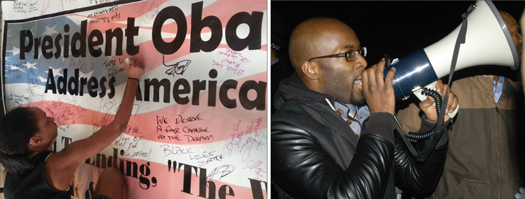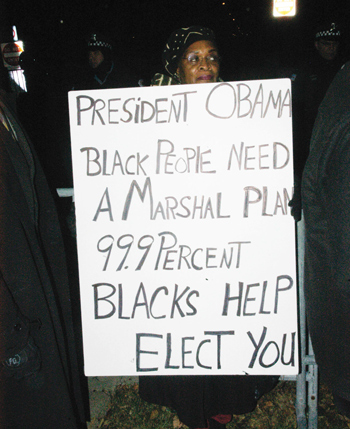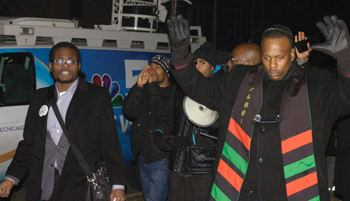Marchers in his hometown demand President Obama address core issues of racism and police misconduct
By La Risa Lynch -Contributing Writer- | Last updated: Dec 29, 2014 - 9:29:00 AMWhat's your opinion on this article?

(L) Protestors want President Obama to address the problems of racism and police brutality. (R) Pastor Jedidiah Brown leads protest near the Chicago home of President Barack Obama. Photos: Haroon Rajaee
|
CHICAGO (FinalCall.com) - The non-indictments of two White police officers in the killings of Eric Garner and Mike Brown left the nation reeling. Massive protests sprouted up in Seattle, Wash., Washington, D.C. and New York and Berkeley, Calif., blasting ongoing police brutality that seemingly targets young Black lives often with fatal consequences.
Chicago was no different. Protests and marches clogged downtown streets and snarled traffic on major thoroughfares including the city’s scenic Lakeshore Drive.

Demonstrators want the president to deal with serious issues of race and inequality in America.
|
“Warfare is typical over freedom or control, and we are in a war where we feel like it is time for America to stop the battles against Black and Brown peoples that don’t allow freedom to truly be experienced at its full capacity,” said Mr. Brown of the Young Leaders Alliance, a multicultural direct action group.
Mr. Brown called the war subliminal, but systemic that takes the form of mass incarceration of Black and Brown people, income inequity between Blacks and Whites, poor neighborhood schools in minority communities and the school-to-prison pipeline affecting Black neighborhoods.
Mr. Obama, he said, must address those issues. Holding White House summits on community-police relations, or sending outgoing U.S. Attorney General Eric Holder to meet with select community leaders or even proposing buying body cameras for this nation’s police force is not enough, said Mr. Brown, who is also a pastor.
“We are not ignoring that he has made attempts. We actually applaud him for the steps he’s made. But we don’t need a Band-Aid,” said Mr. Brown, who said he was abused by Chicago police.
Mr. Brown said he was racially profiled in a 2008 traffic stop where police drew guns on him. He was charged with impersonating a police officer, an offense he later beat. At that time Mr. Brown said he was a registered security guard.
The demonstration near Obama’s home drew nearly 270 people over the two night period. Many of the protesters included mothers who lost loved ones to police involved shootings.
They signed a banner demanding a response from President Obama. That banner will travel to Ferguson, Mo., New York and then the White House collecting more signatures along the way. Mr. Brown vowed to chain himself to a fence outside Mr. Obama’s home until he gets some kind of response.
“The fabric of American society has been conditioned to view the Black man as a subjugated individual that is less than and not worthy of life, liberty and the pursuit of happiness,” Mr. Brown said. “That’s why we have the concept of White privilege. There shouldn’t be any privilege. That right should be extended to all races.”

Chicago’s South Side was the site of protests designed to pressure the U.S. president by coming to his front door or as close as possible.
|
John Beacham, the Chicago coordinator of the ANSWER Coalition, said many of the multi-ethnic participants recognized the oppressive tactics of the Ferguson police department used against protesters as wrong.
The police response to the protesters in the days following the Mike Brown no indictment decision has been criticized as overly militarized. Ferguson police squared off with marchers with drawn weapons and the use of tear gas.
“You don’t raise a rifle unless you are ready to kill people,” said Mr. Beacham, who is White and a member of ANSWER Chicago. That, he added, encouraged people of conscience to stand in solidarity with Blacks in their struggles for more police accountability and an end to racial oppression.
“If people stand up for their own lives and say, ‘We are not going to be killed anymore,’ people in the country understand that,” Mr. Beacham said. “People of conscious have to. It’s not a terribly complicated thing. What else is there for people of conscious to do than to rush out and join the protests, regardless of skin color.”
The ongoing demonstration brought much attention to the often hidden problem of police brutality in Black communities, said Tashika Eubanks, also with ANSWER Chicago. “There is no cut and dry” solutions in curbing police brutality, but the awareness the marches bring “continue to let America know that this is not OK,” she said.
“What America needs to realize in a lot of these communities—like how Mike Brown laid on the ground for four hours with no ambulance—that happens all the time. I’ve seen that my whole life living in Chicago,” said Ms. Eubanks, who at age 12 saw her brother killed in 1991.
“I think America had a chance to see that this happens every day. Police don’t always treat people like they are human,” she added.
“If we are not in the streets who is going to listen to us? Who’s going to know that we are there [and] who’s even going to know we have these grievances?” asked Todd St. Hill, 30.
Mr. St. Hill was one of eight young adults who traveled to Geneva, Switzerland in November. He’s part of the group We Charge Genocide, a grassroots inter-generational group that gives voice to young people impacted by police violence.
The group presented a report on police brutality experienced by Chicago youth to the United Nations Committee Against Torture. For its part, the UN chastised the U.S. government for a variety of criminal justice-related issues, including treatment of suspected terror detainees at Guantanamo Bay in Cuba. But it also singled out the Chicago Police Department for frequent “police shootings or fatal pursuits of unarmed Black individuals.”
Being in the streets, Mr. St. Hill said, works in concert with their presentation to the United Nations. He said the document they presented is important but it must be followed up by some action.
“I think the point that folks are trying to get across is that Black lives matter,” he said. “We are human beings. We deserve to be treated like human beings and we will not be silenced or remain silenced anymore. We need changes in policing.”
INSIDE STORIES AND REVIEWS
-
-
About Harriett ... and the Negro Hollywood Road Show
By Rabiah Muhammad, Guest Columnist » Full Story -
Skepticism greets Jay-Z, NFL talk of inspiring change
By Bryan 18X Crawford and Richard B. Muhammad The Final Call Newspaper @TheFinalCall » Full Story -
The painful problem of Black girls and suicide
By Charlene Muhammad -National Correspondent- » Full Story -
Exploitation of Innocence - Report: Perceptions, policies hurting Black girls
By Charlene Muhammad -National Correspondent- » Full Story -
Big Ballin: Big ideas fuel a father’s Big Baller Brand and brash business sense
By Bryan Crawford -Contributing Writer- » Full Story






 Click Here Stay Connected!
Click Here Stay Connected!








